Solar eclipse of April 17, 1996
| Solar eclipse of April 17, 1996 | |
|---|---|
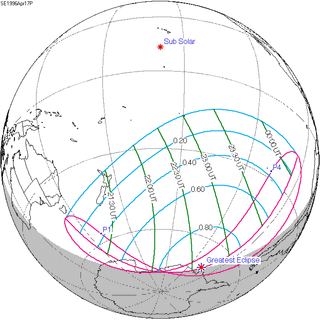 Map | |
| Type of eclipse | |
| Nature | Partial |
| Gamma | -1.058 |
| Magnitude | 0.8799 |
| Maximum eclipse | |
| Coordinates | 71°18′S 104°00′W / 71.3°S 104°W |
| Times (UTC) | |
| Greatest eclipse | 22:38:12 |
| References | |
| Saros | 148 (20 of 75) |
| Catalog # (SE5000) | 9499 |
A partial solar eclipse occurred on April 17, 1996. A solar eclipse occurs when the Moon passes between Earth and the Sun, thereby totally or partly obscuring the image of the Sun for a viewer on Earth. A partial solar eclipse occurs in the polar regions of the Earth when the center of the Moon's shadow misses the Earth.
Images[]

Related eclipses[]
Eclipses of 1996[]
- A total lunar eclipse on April 4.
- A partial solar eclipse on April 17.
- A total lunar eclipse on September 27.
- A partial solar eclipse on October 12.
Solar eclipses 1993–1996[]
This eclipse is a member of a semester series. An eclipse in a semester series of solar eclipses repeats approximately every 177 days and 4 hours (a semester) at alternating nodes of the Moon's orbit.[1]
| Solar eclipse series sets from 1993–1996 | ||||||
|---|---|---|---|---|---|---|
| Descending node | Ascending node | |||||
| Saros | Map | Gamma | Saros | Map | Gamma | |
| 118 | 1993 May 21 Partial |
1.13720 | 123 | 1993 November 13 Partial |
-1.04114 | |
128 Partial from Bismarck, ND |
1994 May 10 Annular |
0.40771 | 133 Totality at Bolivia |
1994 November 3 Total |
-0.35216 | |
| 138 | 1995 April 29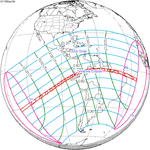 Annular |
-0.33821 | 143 Totality at Dundlod, India |
1995 October 24 Total |
0.35176 | |
| 148 | 1996 April 17 Partial |
-1.05796 | 153 | 1996 October 12 Partial |
1.12265 | |
Metonic series[]
The metonic series repeats eclipses every 19 years (6939.69 days), lasting about 5 cycles. Eclipses occur in nearly the same calendar date. In addition, the octon subseries repeats 1/5 of that or every 3.8 years (1387.94 days). All eclipses in this table occur at the Moon's descending node.
| 22 eclipse events between September 12, 1931 and July 1, 2011. | ||||
|---|---|---|---|---|
| September 11-12 | June 30-July 1 | April 17-19 | February 4-5 | November 22-23 |
| 114 | 116 | 118 | 120 | 122 |
 September 12, 1931 |
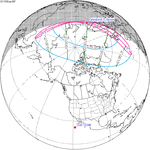 June 30, 1935 |
 April 19, 1939 |
 February 4, 1943 |
 November 23, 1946 |
| 124 | 126 | 128 | 130 | 132 |
 September 12, 1950 |
 June 30, 1954 |
 April 19, 1958 |
 February 5, 1962 |
 November 23, 1965 |
| 134 | 136 | 138 | 140 | 142 |
 September 11, 1969 |
 June 30, 1973 |
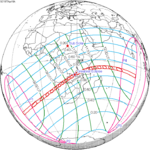 April 18, 1977 |
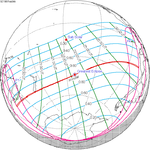 February 4, 1981 |
 November 22, 1984 |
| 144 | 146 | 148 | 150 | 152 |
 September 11, 1988 |
 June 30, 1992 |
 April 17, 1996 |
 February 5, 2000 |
 November 23, 2003 |
| 154 | 156 | |||
 September 11, 2007 |
 July 1, 2011 | |||
References[]
- ^ van Gent, R.H. "Solar- and Lunar-Eclipse Predictions from Antiquity to the Present". A Catalogue of Eclipse Cycles. Utrecht University. Retrieved 6 October 2018.
External links[]
- Partial solar eclipses
- 1996 in science
- 20th-century solar eclipses
- April 1996 events
- Solar eclipse stubs



